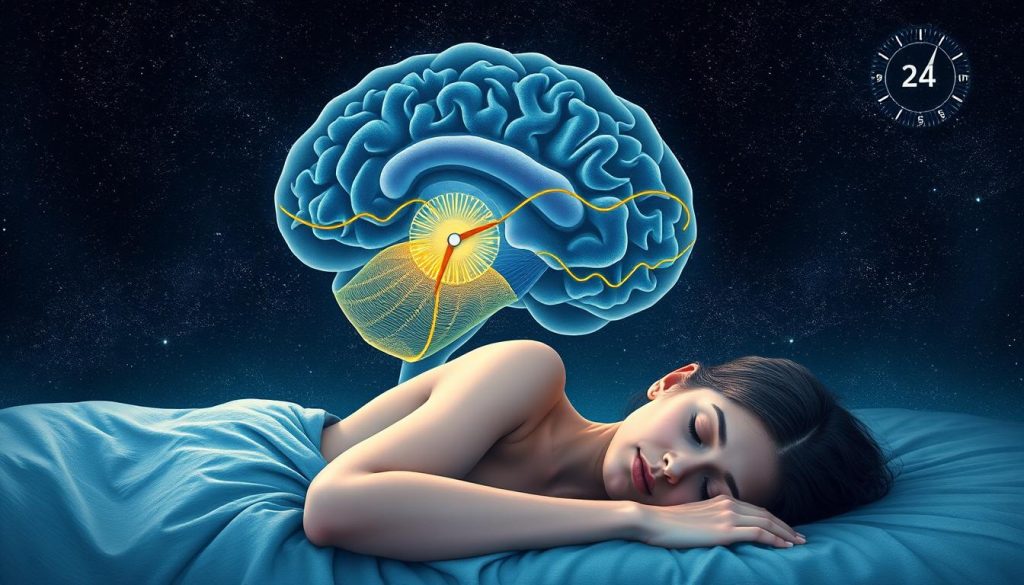Your body has an internal clock that controls more than sleepiness. It affects hormone production and digestion. Eating at the right time is as important as what you eat for your health.
Many people focus on calories and nutrients but overlook timing. Eating at consistent times each day helps your body’s systems work in sync. This balance is key to your overall wellness.
Modern life often messes with our natural rhythms. Late-night snacks, skipping breakfast, and irregular schedules confuse our body’s signals. This can harm our energy, metabolism, and long-term health.
Learning how your body responds to meal timing is more than just science. It’s about getting back to how your body was meant to work. Making small changes in when you eat can lead to big improvements in your daily well-being.
Understanding Circadian Rhythm
Your body has a natural 24-hour clock that controls more than sleepiness. It affects hormone levels and digestion. Knowing about circadian rhythms helps you choose better times to eat, sleep, and be active.
Think of your circadian rhythm as a personal scheduler. It secretly coordinates thousands of biological processes. When it works right, you’re energized during the day and tired at night.
What is Circadian Rhythm?
Circadian rhythm is your body’s internal 24-hour clock. It controls your sleep-wake cycle and other biological functions. The word “circadian” means “about a day” in Latin. This clock is found in almost every living thing on Earth.
Your circadian rhythm works even without sunlight. Scientists have shown this in experiments where people lived in caves or dark rooms for weeks. Their bodies still kept a 24-hour cycle for sleep, body temperature, and hormone production.
This internal clock doesn’t just control sleepiness. It also manages body temperature, blood pressure, and hormone release. Your digestive system follows this rhythm too, producing enzymes at specific times to process food efficiently.

The Science Behind It
The master control center for your circadian rhythm is in a tiny part of your brain called the suprachiasmatic nucleus. This area sends timing signals to every organ and tissue in your body.
Light is the main signal that keeps your internal clock in sync with the outside world. Special cells in your eyes detect light and send this information to your brain’s master clock. Morning light helps reset your rhythm and makes you feel alert.
Irregular light exposure or light at the wrong times can disrupt your circadian rhythm. This is common with shift work, jet lag, or too much screen time before bed. Artificial light, especially blue light from devices, can confuse your internal clock and delay sleep.
Your body also has peripheral clocks in organs like your liver, heart, and digestive system. These clocks work with your brain’s master clock to coordinate your body’s functions throughout the day.
How It Affects Body Functions
Your circadian rhythm affects every system in your body. During the day, it promotes the release of cortisol, which makes you feel alert and energized. As evening comes, cortisol levels drop, and melatonin production increases, preparing your body for sleep.
Your digestive system also follows this internal schedule. Stomach acid production peaks during meal times, while digestive enzymes are released in anticipation of food. This is why eating late at night can feel uncomfortable and may disrupt your sleep-wake cycle.
Body temperature also changes according to your circadian rhythm. It drops in the early morning hours and rises throughout the day. This temperature cycle helps signal to your body when it’s time to be awake or asleep.
When circadian disruption occurs, these coordinated functions become misaligned. You might experience poor sleep quality, digestive issues, mood changes, and difficulty concentrating. Understanding these connections helps explain why regular sleep and meal schedules are key for your health.
The Connection Between Meal Timing and Circadian Rhythm
Chrononutrition shows how our digestive system works on its own schedule, matching our circadian rhythm. This connection means our bodies digest food better at certain times.
Your digestive system has daily patterns for better nutrient absorption. Stomach acid is highest in the morning and goes down as the day goes on. Digestive enzymes also follow a 24-hour cycle, working best when you eat.

Gut motility, or how food moves through your system, also follows your internal clock. This is why eating late can cause discomfort and bad sleep.
Importance of Timing Your Meals
Eating at the right times works with your body’s natural rhythm. This helps keep your energy levels up all day.
Here are some key meal timing tips for better metabolic health:
- Morning meals boost your metabolism when you’re most sensitive to insulin
- Afternoon meals keep your energy steady during busy hours
- Evening meals should be light to help your body rest
- Eating late can mess with your sleep and morning energy
Studies in chrononutrition show eating at different times affects your metabolism differently. Your body processes nutrients better when meals match your natural clock.
How Meal Timing Influences Metabolism
Your metabolism changes throughout the day, following a precise schedule. Insulin sensitivity is highest in the morning and goes down at night.
This means your body handles carbs and sugars better in the morning. A breakfast with complex carbs affects your blood sugar differently than the same meal at dinner.
The benefits of eating at the right time include:
- Better glucose tolerance in the morning
- Improved fat burning during overnight fasting
- Better nutrient absorption when digestive enzymes are most active
- Less inflammation from eating at the best times
Knowing these natural rhythms helps you choose the best times to eat for better metabolic health. Your body’s internal clock guides you to make the most of every meal.
Health Benefits of Aligning Meals with Your Circadian Rhythm
Eating in sync with your body’s natural rhythms offers more than just good nutrition. It leads to a series of health benefits that boost your overall well-being. Your body works best when it gets food at the right times.
Your digestive system, sleep, and metabolism all get better when you eat on schedule. You might notice these changes in just a few weeks. Let’s look at how eating at the right times can improve your health.
Better Digestive Function
Your digestive system has its own daily schedule. It makes enzymes and stomach acid at certain times. Eating during these peak hours helps your body digest food better.
This means less bloating, less acid reflux, and fewer stomach problems. Your digestive system is strongest in the morning and early afternoon. Eating big meals then helps your body use nutrients well. Eating late at night makes your digestive system work when it should be resting.
Better Sleep at Night
Eating on schedule improves your sleep by letting your body repair itself at night. Stopping food intake 3-4 hours before bed helps your body repair better.

Eating late at night keeps your digestive system awake. This can cause poor sleep, waking up often, and feeling tired in the morning. Eating when your body is aligned with its natural rhythms helps you sleep better.
Effective Weight Control
Eating in sync with your body’s rhythms helps with weight management. Your metabolism is highest during the day, making it easier to burn calories from meals eaten then.
This approach also helps control cravings at night, which can lead to overeating. Regular meal times keep your blood sugar stable. This reduces hunger and makes it easier to control how much you eat.
These benefits work together to create a positive cycle. Better digestion and sleep help maintain a healthy weight. This shows why meal timing is key for your health.
Common Meal Timing Patterns and Their Effects
Many meal timing strategies have been found to work well with our body’s natural rhythms. Each one has its own benefits when matched with our circadian cycles. The goal is to find a pattern that fits your life and supports your internal clock.
These eating schedules range from ancient practices to modern adaptations. They all share a common thread: respecting the body’s natural metabolic peaks and valleys throughout the day.
Intermittent Fasting
Intermittent fasting extends your overnight fast to give your body more time for repair and metabolic reset. It allows your digestive system to rest during natural low-energy periods.
The most popular method involves fasting for 16 hours and eating within an 8-hour window. Many people find it easy by skipping breakfast or dinner. Your body uses this time to complete important maintenance tasks.

Research shows that intermittent fasting can improve insulin sensitivity when the eating window aligns with daylight hours. This timing takes advantage of your body’s natural ability to process food more efficiently during active periods.
Time-Restricted Eating
Time-restricted eating focuses on when you eat rather than what you eat. It limits your daily food intake to specific hours that match your circadian rhythm’s active phase.
The 16:8 method is the most common form of time-restricted eating. You eat all your meals within 8 hours and fast for the remaining 16 hours. This schedule often means eating between 10 AM and 6 PM or 12 PM and 8 PM.
Success with time-restricted eating depends on choosing an eating window that aligns with your natural energy patterns. Most people perform best when their eating window coincides with peak daylight hours and highest metabolic activity.
Traditional Meal Patterns
The conventional three-meals-a-day structure can effectively support circadian health when properly timed. This familiar pattern works well for people who prefer regular, predictable meal schedules.
A circadian-friendly traditional pattern includes a substantial breakfast during peak insulin sensitivity around 7-9 AM. Lunch should occur during continued high metabolic activity between 12-2 PM. Dinner works best as a lighter meal finished at least 3 hours before bedtime.
This approach allows for social eating and family meals while still respecting your body’s natural rhythms. The key is adjusting portion sizes throughout the day, with larger meals earlier when your metabolism runs strongest.
Remember that no single pattern works for everyone. Your ideal eating schedule depends on your work schedule, family commitments, and personal preferences. The most important factor is consistency in whatever pattern you choose.
Tips for Synchronizing Your Eating Schedule
Changing your eating schedule doesn’t mean you have to change your whole life. Small changes can make a big difference in how your body handles food and sleep.
Start with Simple Timing Changes
Eat your biggest meal within three hours of waking up. Your body is best at processing food in the morning. Stop eating three hours before bed to let your stomach rest. This helps keep your body’s clock in sync.
Build Steady Daily Patterns
Stick to the same meal times every day, even on weekends. Your body likes routine. If your schedule changes, try to keep your eating times the same. Even small steps can boost your metabolism and energy.
Choose Foods That Support Your Body Clock
Start your day with protein to help your body wake up. Try turkey, eggs, or Greek yogurt. They have tryptophan, which helps you sleep better at night. Avoid caffeine after 2 PM to help you sleep well.
It’s okay if you can’t always stick to the perfect schedule. Just keep moving forward. Your body will adjust as you make meal times more consistent.

